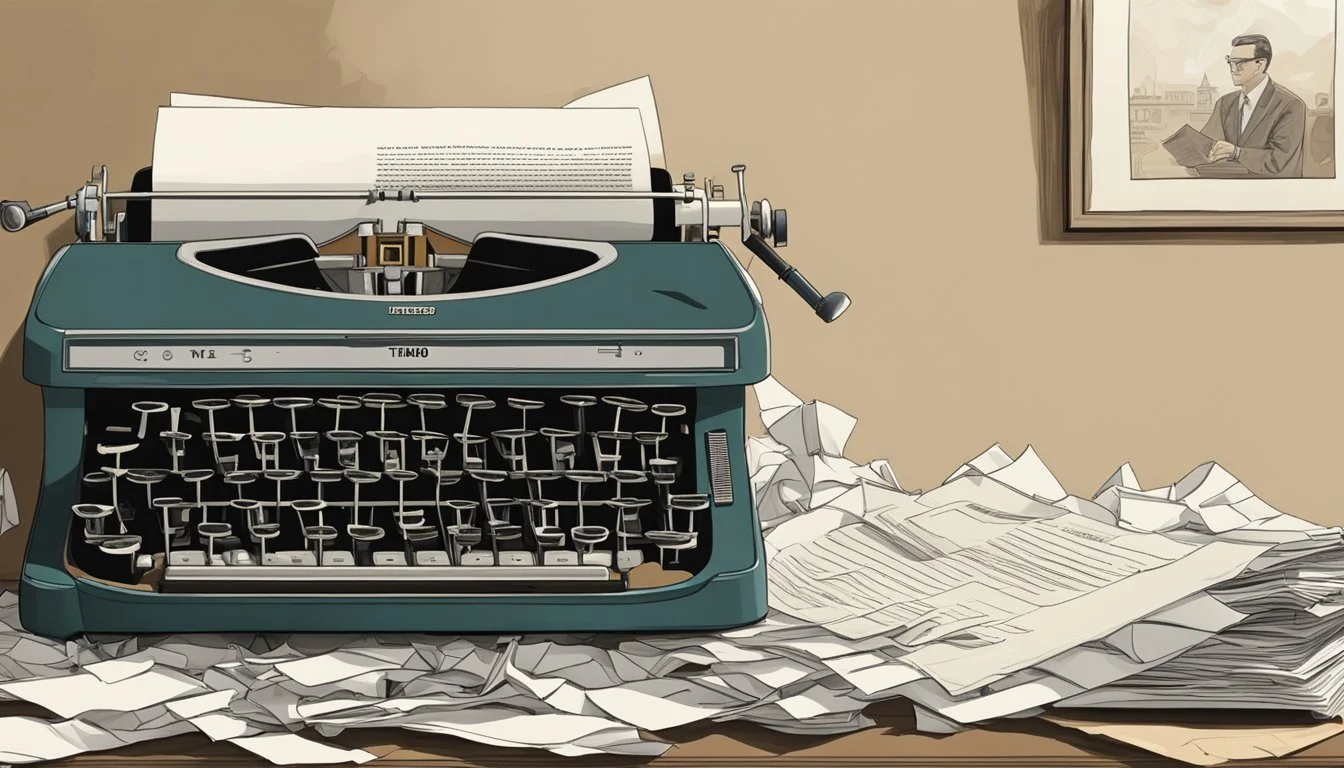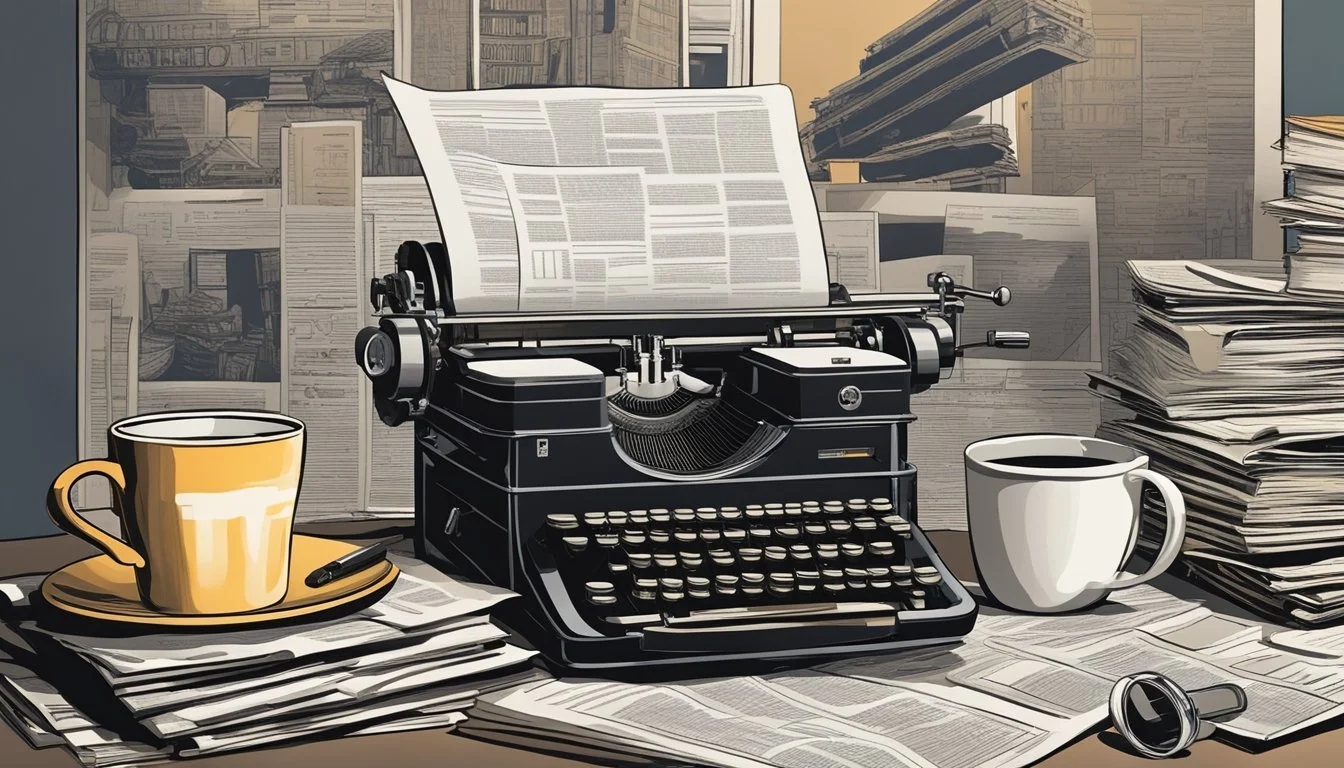Blacklist to Big Screen: The True Story of 'Trumbo'
Hollywood's Defiant Screenwriter
Dalton Trumbo's journey from blacklisted writer to Hollywood legend is a tale of resilience and artistic triumph. In the 1940s and 50s, Trumbo found himself at the center of a political storm that engulfed the film industry. Accused of communist sympathies, he and other prominent figures were barred from working in Hollywood.
Despite being blacklisted, Trumbo continued to write screenplays under pseudonyms, winning two Academy Awards for Roman Holiday and The Brave One while unable to claim credit for his work. His story of perseverance in the face of persecution has captivated audiences and inspired filmmakers.
The 2015 film "Trumbo," starring Bryan Cranston, brings this dramatic chapter of Hollywood history to life. It portrays Trumbo's struggle to maintain his craft and integrity while battling a system that sought to silence him. The movie offers a compelling look at a dark period in American cinema and the indomitable spirit of one of its most talented writers.
The Golden Age of Hollywood and the Rise of Dalton Trumbo
Dalton Trumbo emerged as a prolific screenwriter during Hollywood's Golden Age, ascending to prominence through his talent and adaptability. His journey from novelist to acclaimed screenwriter coincided with a period of glamour and artistic innovation in the film industry.
From Novelist to Screenwriter
Dalton Trumbo began his writing career as a novelist in the 1930s. The Great Depression shaped his early works, infusing them with social commentary. As Hollywood's demand for talented writers grew, Trumbo transitioned to screenwriting.
His sharp wit and ability to craft compelling narratives quickly caught the attention of major studios. Trumbo's versatility allowed him to write across genres, from war dramas to romantic comedies. This adaptability proved crucial in establishing his reputation in the competitive world of Hollywood scriptwriting.
Peaking in an Era of Glamour
The 1940s and early 1950s marked the zenith of Trumbo's career, paralleling Hollywood's Golden Age. He penned critically acclaimed scripts for films like "Thirty Seconds Over Tokyo" (1944), showcasing his skill in dramatizing World War II stories.
Trumbo's talent reached new heights with "Roman Holiday" (1953). The film's success earned him an Academy Award, although he couldn't claim it publicly due to the Hollywood blacklist. Despite political challenges, Trumbo's work continued to shape cinema, contributing to the era's reputation for producing timeless classics.
Cultural and Political Climate of the 1940s and 1950s
The 1940s and 1950s in America were marked by intense political tensions and ideological conflicts. This period saw a dramatic shift in societal attitudes, shaped by fears of communism and concerns over national security.
The Red Scare and the Hollywood Ten
The Red Scare gripped the United States in the aftermath of World War II. Fear of communist infiltration spread rapidly, affecting various sectors of society, including the entertainment industry.
In 1947, the House Un-American Activities Committee (HUAC) turned its attention to Hollywood. Ten film industry professionals, later known as the Hollywood Ten, refused to answer questions about their alleged Communist Party affiliations.
These individuals, including screenwriter Dalton Trumbo, cited their First Amendment rights. Their defiance led to contempt of Congress charges and prison sentences.
Trumbo's Political Affiliation and Ideals
Dalton Trumbo was a member of the Communist Party from 1943 to 1948. He was drawn to the party's ideals of social justice and economic equality.
Trumbo's political beliefs influenced his writing. He often explored themes of workers' rights and social inequality in his screenplays.
Despite his party membership, Trumbo maintained that his political views did not compromise his loyalty to the United States. He viewed his affiliation as a legitimate exercise of his civil liberties.
The Impact of the House Un-American Activities Committee
HUAC's investigations had far-reaching consequences for the entertainment industry. The committee's actions led to the creation of the Hollywood blacklist.
Suspected communists and their sympathizers were denied work in the film industry. Many careers were destroyed, and some individuals were forced to work under pseudonyms.
The blacklist era challenged fundamental American values of free speech and association. It created an atmosphere of fear and suspicion, impacting artistic expression and personal relationships in Hollywood.
HUAC's activities sparked debates about the balance between national security and individual rights. These discussions continue to resonate in contemporary political discourse.
The Hollywood Blacklist and Its Effects
The Hollywood Blacklist devastated careers and livelihoods in the film industry during the 1940s and 1950s. It forced many talented artists to work in secret or abandon their professions entirely.
The Mechanisms of Blacklisting
The Hollywood Blacklist emerged from anti-communist fervor during the Cold War. Studio executives, bowing to political pressure, refused to hire those suspected of communist ties.
The House Un-American Activities Committee (HUAC) held public hearings in 1947. They questioned entertainment professionals about their political beliefs and associations.
Those who refused to cooperate, like the "Hollywood Ten," faced contempt charges and prison time. Hundreds more were named as communists or sympathizers in private testimony.
Studios issued the Waldorf Statement in 1947, declaring they would not employ communists. This policy expanded to include anyone who refused to testify before HUAC.
Trumbo's Life during the Blacklist
Dalton Trumbo, a successful screenwriter, became one of the Hollywood Ten. He spent 11 months in prison for contempt of Congress in 1950.
After his release, Trumbo struggled to find work openly. He sold his ranch and moved his family to Mexico City to reduce expenses.
Trumbo wrote scripts under pseudonyms or used "fronts" - other writers who put their names on his work. He worked tirelessly, often for much less pay than before.
Despite these challenges, Trumbo continued to produce high-quality scripts. His talent allowed him to remain prolific even while blacklisted.
The Use of Pseudonyms and Fronts
Blacklisted writers like Trumbo relied on pseudonyms and fronts to continue working. This system allowed them to earn a living while studios maintained plausible deniability.
Trumbo used the pseudonym "Robert Rich" for his script of "The Brave One." The film won an Academy Award for Best Story in 1957, highlighting the absurdity of the blacklist.
Some non-blacklisted writers acted as fronts, putting their names on scripts written by others. This arrangement was risky, as discovery could end their own careers.
The use of pseudonyms and fronts demonstrated both the resilience of blacklisted writers and the hypocrisy of the system that excluded them.
Trumbo's Triumphs Despite Adversity
Dalton Trumbo's resilience and talent allowed him to overcome the Hollywood blacklist and achieve remarkable success. His covert work, eventual public recognition, and lasting impact on the film industry demonstrate his unwavering dedication to his craft.
Covert Contributions to Hollywood Classics
Despite being blacklisted, Trumbo continued writing screenplays under pseudonyms and through fronts. He penned the script for "Roman Holiday" (1953), which won an Academy Award for Best Story. The Oscar was initially given to Ian McLellan Hunter, who acted as Trumbo's front.
Trumbo also wrote "The Brave One" (1956) under the name Robert Rich. This screenplay won another Academy Award, further showcasing his talent even while working in secrecy.
His uncredited work extended to other notable films, including "Exodus" and "Spartacus," both released in 1960.
The Breaking of the Blacklist
Kirk Douglas played a crucial role in ending Trumbo's time on the blacklist. As the star and executive producer of "Spartacus," Douglas insisted on crediting Trumbo for his work on the film.
Otto Preminger followed suit, announcing that Trumbo would receive screen credit for "Exodus." These bold moves by influential Hollywood figures effectively broke the power of the blacklist.
Trumbo's public acknowledgment marked a turning point in Hollywood's stance on blacklisted writers and signaled the beginning of the end for this dark period in the industry's history.
Recognition and Restoration of Reputation
After the blacklist's fall, Trumbo's reputation was gradually restored. He received proper credit for his earlier works, including "Roman Holiday."
In 1975, the Writers Guild of America officially recognized Trumbo as the writer of "Roman Holiday" and presented him with a Screen Writers Guild Award.
Posthumously, in 1993, Trumbo was awarded the Oscar for "Roman Holiday," finally receiving the recognition he deserved 40 years after the film's release.
His story became the subject of a 2015 biopic titled "Trumbo," starring Bryan Cranston. The film brought renewed attention to Trumbo's struggles and triumphs, introducing his remarkable story to a new generation of viewers.
Legacies of Blacklisted Hollywood
The Hollywood blacklist left an indelible mark on the film industry and American culture. Its effects rippled through generations of filmmakers and continue to inform discussions about artistic freedom and political expression today.
Impact on Later Generations in the Film Industry
The blacklist era influenced how subsequent filmmakers approached controversial topics. Many directors and writers became more cautious about addressing political themes in their work. Some, inspired by the courage of blacklisted artists, pushed boundaries and created thought-provoking films that challenged societal norms.
The experiences of blacklisted writers like Dalton Trumbo sparked interest in telling their stories. Films such as "Trumbo" (2015) brought renewed attention to this dark period in Hollywood history. These productions educated younger generations about the importance of free speech in the arts.
Reflections in Current Sociopolitical Discussions
The Hollywood blacklist remains a potent reference point in debates about censorship and political pressure on artists. Its legacy prompts discussions about the balance between national security concerns and individual rights.
Contemporary conversations often draw parallels between the anti-communist fervor of the 1950s and modern political climates. The blacklist serves as a cautionary tale about the dangers of suppressing dissent and limiting artistic expression.
Activists and artists frequently invoke the blacklist when advocating for freedom of speech. They use it to highlight the long-term consequences of allowing fear to dictate cultural and political norms.
The Cinematic Retelling of Trumbo's Journey
The 2015 film "Trumbo" brings Dalton Trumbo's remarkable story to life, showcasing his struggles and triumphs during the Hollywood blacklist era. It offers a compelling look at the screenwriter's resilience and creative ingenuity in the face of political persecution.
Casting Trumbo: From Paper to Screen
Director Jay Roach assembled a stellar cast to portray the key figures in Trumbo's life. Bryan Cranston took on the challenging role of Dalton Trumbo, bringing depth and nuance to the character. Helen Mirren portrayed gossip columnist Hedda Hopper, while Michael Stuhlbarg played actor Edward G. Robinson.
John Goodman and Diane Lane joined the ensemble as film producer Frank King and Trumbo's wife Cleo, respectively. Elle Fanning rounded out the cast as Trumbo's daughter Nikola.
This talented group of actors brought authenticity and emotional weight to their performances, helping to create a vivid portrayal of 1950s Hollywood.
Critical Reception and Historical Accuracy
"Trumbo" premiered at the Toronto International Film Festival to positive reviews. Critics praised the film's exploration of a dark period in Hollywood history and its portrayal of Trumbo's resilience.
Some historians noted minor inaccuracies in the film's timeline and character depictions. However, many agreed that it captured the essence of Trumbo's experiences and the broader impact of the blacklist on the film industry.
The movie struck a balance between entertainment and education, introducing audiences to a crucial chapter in American cultural history. It shed light on the personal costs of standing up for one's beliefs in the face of political pressure.
Trumbo's Portrayal and Performance by Bryan Cranston
Bryan Cranston's portrayal of Dalton Trumbo earned him widespread acclaim and several award nominations. He captured Trumbo's wit, determination, and complexity with remarkable skill.
Cranston's performance highlighted Trumbo's passionate commitment to his craft and his principles. He conveyed the screenwriter's struggle to maintain his artistic integrity while working under pseudonyms to support his family.
The actor's nuanced portrayal brought to life Trumbo's relationships with his family, fellow writers, and industry figures. Cranston's embodiment of Trumbo's mannerisms and speech patterns added authenticity to the role, helping viewers connect with this historical figure on a personal level.
Personal and Familial Perspectives
The blacklisting of Dalton Trumbo profoundly affected his family life and relationships. His wife Cleo and children Christopher and Nikola experienced firsthand the challenges and repercussions of his political stance.
The Trumbo Family's Response to Blacklisting
Cleo Trumbo stood firmly by her husband's side throughout the ordeal. She managed the household finances and supported Dalton's continued writing efforts under pseudonyms. The family faced significant economic hardship, moving from their luxurious ranch to a smaller apartment.
Christopher Trumbo, Dalton's son, later recounted the strain placed on the family. He described a mix of pride in his father's principles and frustration at the difficulties they endured. The children learned to be cautious about revealing their father's identity to outsiders.
Despite the challenges, the Trumbos maintained a united front. They found ways to cope with the stress, often using humor to lighten tense situations.
Letters and Intimate Insights
Dalton Trumbo's correspondence during the blacklist era provides a window into his personal struggles and resilience. His letters to friends, colleagues, and family members reveal a mix of defiance, wit, and occasional despair.
In one poignant letter, Trumbo reflected on the impact of his choices:
"I went spectacularly broke," he admitted, highlighting the financial toll of his principles.
These intimate writings also showcase Trumbo's unwavering commitment to his craft. He continued to write prolifically, including his anti-war novel "Johnny Got His Gun," which he penned during this tumultuous period.
The letters offer a nuanced view of Trumbo as a family man, revealing his deep love for his wife and children alongside his political convictions.
The Legacy Left for His Children
Dalton Trumbo's experiences during the blacklist era shaped his children's worldviews and career paths. Christopher Trumbo became a screenwriter and playwright, often exploring themes of political persecution in his work.
The Trumbo children inherited their father's passion for social justice and freedom of expression. They played crucial roles in preserving and sharing Dalton's story after his death.
Christopher, in particular, worked to document his father's life through interviews, writings, and the play "Trumbo: Red, White and Blacklisted." This effort helped bring wider attention to the impact of the Hollywood blacklist on families.
The enduring legacy of Dalton Trumbo's stand against political repression continues to inspire discussions about artistic freedom and civil liberties.
Concluding Thoughts
Dalton Trumbo's journey from blacklisted writer to Hollywood legend exemplifies the resilience of creative spirit in the face of political persecution. His unwavering commitment to his craft, even while working under pseudonyms, allowed him to continue producing exceptional screenplays.
Trumbo's story serves as a powerful reminder of the importance of free speech and artistic expression. His ability to pen award-winning scripts like "Roman Holiday" and "The Brave One" while blacklisted demonstrates the futility of attempts to suppress talent.
The film "Trumbo" brings this crucial chapter of Hollywood history to life for modern audiences. It sheds light on the personal and professional struggles Trumbo endured during the blacklist era, while celebrating his ultimate triumph.
Trumbo's legacy extends beyond his impressive body of work. His experience highlights the dangers of political witch hunts and the value of standing up for one's principles, even at great personal cost.
The story of Dalton Trumbo continues to resonate today, reminding us of the ongoing need to protect artistic freedom and resist ideological censorship in all its forms.





